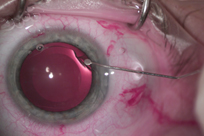Dr. Raymond Stein of the Bochner Eye Institute wrote the following clinical update. We hope you find it of interest.
Phakic implants are used for the correction of high refractive errors that cannot be treated by a laser. Over the past 13 years we have been inserting the Implantable Contact Lens (ICL), a posterior chamber phakic implant made by Starr Surgical. Clinical outcomes for high myopia and astigmatism have generally been excellent with 95% of patients achieving 20/30 or better uncorrected vision. The main indications are refractive errors that are too high for laser vision correction. In general, patients are candidates for a phakic implant if they have myopia greater than 10 D or hyperopia greater than 5 D. Astigmatism can be treated up to 6 D. Patients must have a satisfactory depth of the anterior chamber (distance between the corneal endothelium and the crystalline lens) of greater or equal to 2.8 mm. Most of the high myopes will qualify for the implant. Patients should also have a pupil size of 7 mm or less.
Another surgical option, which patients need to know about in the informed consent, is refractive lens exchange (RLE). Our preference is not to perform a lens exchange for high myopia because of the increased risk of retinal tears and detachment. This is not the case with the treatment of high hyperopia, which is associated with a minimal retinal risk.
In patients that are good candidates for the ICL, a refraction is performed, the limbal white-to-white distance is measured to determine the length of the implant, and two small YAG laser iridotomies are performed to reduce the risk of elevated intraocular pressure from papillary block. The implant is custom ordered from Switzerland.
 The surgical procedure is relatively easy for patients. At the Bochner Eye Institute we perform this procedure in our sterile operating room approved by the Ontario College of Physicians and Surgeons. Under topical anesthesia a 2.8 mm limbal incision is constructed. Intraocular xylcaine is injected to numb the contents of the eye. After the implant has been carefully folded into a cartridge, it is injected into the anterior chamber where it gradually unfolds. Using a specialized instrument the haptics are gently placed behind the iris. Miochol is then injected to constrict the pupil. Intraocular Vancomycin is injected to prevent infection. The patient is then checked one hour postoperatively, which allows Raymond Stein and his team to monitor the intraocular pressure and ensure that it is normal. Follow-up examinations are usually scheduled 1 day, 1 week, 1 month, and 3 months post-surgery.
The surgical procedure is relatively easy for patients. At the Bochner Eye Institute we perform this procedure in our sterile operating room approved by the Ontario College of Physicians and Surgeons. Under topical anesthesia a 2.8 mm limbal incision is constructed. Intraocular xylcaine is injected to numb the contents of the eye. After the implant has been carefully folded into a cartridge, it is injected into the anterior chamber where it gradually unfolds. Using a specialized instrument the haptics are gently placed behind the iris. Miochol is then injected to constrict the pupil. Intraocular Vancomycin is injected to prevent infection. The patient is then checked one hour postoperatively, which allows Raymond Stein and his team to monitor the intraocular pressure and ensure that it is normal. Follow-up examinations are usually scheduled 1 day, 1 week, 1 month, and 3 months post-surgery.
Complications are rare. The main risk is inducing a cataract (1%). If patients are not satisfied with their level of uncorrected vision then laser vision correction can be performed. We have not had a case of infection for more than 13 years.
Specialized indications for the ICL include patients with keratoconus and those following radial keratotomy. In keratoconus patients if they have satisfactory best-corrected spectacle acuity (20/40 or better) then consideration can be given to the ICL. Patients may require an Intracorneal ring to reduce the degree of irregular astigmatism prior to a phakic implant. In the situation following radial keratotomy, if patients have developed a hyperopic shift then this can be corrected by the ICL. Unlike a natural hyperope the post-RK eyes were previously myopic and usually have a satisfactory anterior chamber depth.
The Bochner Eye Institute is a leading-edge eye care facility led by Dr. Raymond Stein Toronto patients visit for all their vision correction needs.
 A recent study found an increase in fall-related eye injuries, and experts suspect that common vision conditions like cataracts and glaucoma may be to blame. But Dr. Raymond Stein and the team at Bochner Eye Institute believe that some of these falls and injuries can be prevented by taking proactive measures. Continue reading
A recent study found an increase in fall-related eye injuries, and experts suspect that common vision conditions like cataracts and glaucoma may be to blame. But Dr. Raymond Stein and the team at Bochner Eye Institute believe that some of these falls and injuries can be prevented by taking proactive measures. Continue reading 



 The surgical procedure is relatively easy for patients. At the Bochner Eye Institute we perform this procedure in our sterile operating room approved by the Ontario College of Physicians and Surgeons. Under topical anesthesia a 2.8 mm limbal incision is constructed. Intraocular xylcaine is injected to numb the contents of the eye. After the implant has been carefully folded into a cartridge, it is injected into the anterior chamber where it gradually unfolds. Using a specialized instrument the haptics are gently placed behind the iris. Miochol is then injected to constrict the pupil. Intraocular Vancomycin is injected to prevent infection. The patient is then checked one hour postoperatively, which allows
The surgical procedure is relatively easy for patients. At the Bochner Eye Institute we perform this procedure in our sterile operating room approved by the Ontario College of Physicians and Surgeons. Under topical anesthesia a 2.8 mm limbal incision is constructed. Intraocular xylcaine is injected to numb the contents of the eye. After the implant has been carefully folded into a cartridge, it is injected into the anterior chamber where it gradually unfolds. Using a specialized instrument the haptics are gently placed behind the iris. Miochol is then injected to constrict the pupil. Intraocular Vancomycin is injected to prevent infection. The patient is then checked one hour postoperatively, which allows